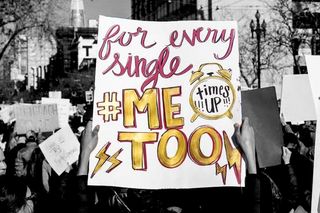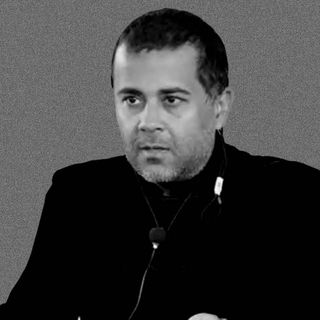
All the Arguments You Need: To Convince Doubters of #MeToo
Your guide to surviving any social gathering this week.

In our All The Arguments You Need series, we take on mindsets standing in the way of progress and rebut them with facts and logic.
Ever since the #MeToo and #TimesUp movements erupted last week, it seems everyone is having debates — on social media, in offices, with friends, on chat groups — and a lot of the same, tired critiques of the movement come up at every turn.
If you’re certain you #BelieveWomen, but you’re getting tripped up when some of these criticisms of the movement come up socially, here’s your handy guide to rebutting the most common #MeToo critiques:
“So, now men have to be the ones who are scared all the time? They need to watch every little thing they say to every woman?”
In a word: yes. Women are saying: We are constantly living in fear of being harassed, groped, threatened, or made to feel uncomfortable in spaces that are supposed to be safe. Hopefully, any man who hears that collective message from thousands of women should be happy to stop and consider what is making them feel that way. If it makes men pause and reflect before doing anything that could be deemed borderline harassment, that’s a good thing.
Furthermore, women watch what they say all the time and are constantly wary of saying or doing something that might invite unwelcome advances from men. So, maybe it’s time to reverse this, and encourage men to be conscious about the consequences of their words as well?
Finally, most of the men we have spoken to, who have always treated us well, have no problem with their behavior towards women being scrutinized. If someone panics about this, you have to wonder — what are they so worried about?
Got feelings about #MeTooIndia? Let them out by taking our survey.
“Come on now, these accusations have gone too far! These are not harassment.”
In many instances that have been reported, the behavior of the accused violates laws and is actually criminal. In many others, it is also behavior that would likely run afoul of an employer’s sexual harassment policy.
But many more instances don’t squarely fit into either of those categories. The important thing to remember about this movement is that it demands a redefinition of what constitutes acceptable behavior, and what constitutes harassment. Men in power originally defined what is acceptable in the home, at work and in society, and so that definition has historically favored men to the exclusion of women’s perspectives.
Also, an essential part of determining harassment depends on the impact of the behavior, that is, how it is experienced by the recipient, not on the intentions of the perpetrator. So, whether a man “meant it” is besides the point; how it made the person on the receiving end feel is what’s relevant.
Finally, given the sheer volume of women coming out and describing similar behavior they all feel is predatory, it’s important to listen to those voices and perhaps reassess our definitions.
“None of this can be proven. It will always be he-said, she-said.”
Well, some of it can be proven; so let’s start by not minimizing the stories of women who come forward with proof or documentation or witnesses.
But for those instances that happened a long time ago, and/or where there is no visible physical evidence, we have to switch the default from automatically believing men to automatically believing women. There are a few reasons for this: First, we have historically always prioritized the experiences and voices of men; the laws, reporting structures, and definitions were created by them, and favor them. Women’s experiences have never been included in our societal interpretations of what constitutes inappropriate behavior. This movement is a call to include women’s experiences in our social frameworks. This requires that we listen to and believe women when they tell us what has happened to them.
“These are leaders in their field and don’t deserve to lose their careers over this. They have families to provide for.”
Why are we only thinking of men’s careers being ruined, when the outcome of this kind of behavior has historically stunted women’s careers, through no fault of their own?
“#MeToo is going too far; it’s not doing women any favors now!”
What does it mean for women’s experiences to “go too far”? How does any part of the movement undercut the argument that we need to reckon with the fact that, for centuries, women’s voices and experiences have been left out of our conversations around what are appropriate boundaries and behavior? If the movement brings about change in those structures, or encourages people to treat more equally others who have less power, that is a desirable outcome.
Furthermore, saying “this has gone too far” implies that you don’t believe some of the women speaking up. You can only think the movement is compromised if you feel a significant proportion of complaints is illegitimate.
“But none of these women said no, or asked the men to stop messaging. This is just making victims out of women.”
No, #MeToo and #TimesUp are not about painting women as helpless victims. They are about exposing the power hierarchies that exist in our societies, which frequently make it very difficult for women to speak up. People who sit in positions of extreme privilege are frequently unable to understand how someone without it might not have as strong a voice. But a young woman, at the early stages of her career, for example, may not feel that she can react strongly if an older, more powerful man comes on to her, particularly if she feels that he can impact her career and livelihood. These power imbalances make speaking up, or saying a definitive no, almost impossible for many women.
Inherent in this argument is also the presumption that just because a woman speaks up, she must automatically view herself as a victim. Perhaps they are simply tired of putting up with inappropriate behavior, and speaking up is a form of taking back some power.
“These men are just flirting. This is harmless. These young women are overreacting. Is romance just dead now?”
It’s time for the ‘boys will be boys’ trope to be deleted from debate entirely. If thousands of woman are saying that behavior harmed them, it’s not harmless behavior. Perhaps it’s time to rethink how we define romance. Maybe women do not enjoy being pursued in the way that our societies have generally framed romance in literature and film. If it’s making this many women this uncomfortable, it’s safe to say this outdated version of romance is indeed dead.
“People should be innocent until proven guilty. These Twitter outings are smear campaigns without due process.”
No one is sending these men to jail! (In fact, that’s part of the problem.) Society has historically failed victims of assault and harassment, by creating reporting structures that frequently shame the victim, and ultimately are ineffective. Where our legal or professional structures have failed, now women are speaking publicly. Given that social media does not threaten anyone with jail time, or financial penalties, the burden of proof is not the same as it would be a in a court of law. The point of these outings is to put social pressure on people to examine and react to predatory behavior, not to incarcerate people without due process.
“She’s just being opportunistic. Why didn’t she mention this before? She’s just doing it for attention.”
Sexual assault survivors have nothing to gain by coming forward — and much more to lose. Whether it’s Tanushree Dutta, who had her property defaced, and her reputation and motives questioned publicly, or Christine Blasey Ford, who has been living in hiding because of death threats, victims who come forward are usually dropping a horrific bomb on their entire lives. Society has treated them horribly by questioning their motives, picking apart their appearance and behavior, defaming their character. It’s very difficult to imagine anyone would go through that for any reason other than wanting justice.
“These women are just making it up.”
See above. Given the horrific abuses that have frequently been heaped upon survivors who speak up, it’s hard to imagine anyone wanting to do that without real trauma or discomfort driving them to seek justice or resolution. In fact, in India and around the world, the opposite problem is far more common; all data points to the fact that sexual assault is one of the most heavily underreported crimes, specifically because of the stigma, poor treatment, and shame that going public brings. It’s very hard to get accurate statistics around sexual assaults precisely because so few victims come forward, but experts estimate that approximately 2 to 5% of all sexual assault accusations are false. Put another way, most likely 98% of these women are telling the truth. That’s pretty compelling data to make #BelieveWomen the default position.
“We’re not listening to the men who have been accused. Their lives are ruined now. They are suffering.”
Are they suffering? Well, if the Salman Khan example is anything to go by, even serious accusations of assault by a celebrity victim aren’t enough to tank a career. In the US, a man who admitted on camera to sexually harassing a woman is now president, and a man who was accused by three women of sexual assault or harassment is now serving a lifetime appointment on the Supreme Court. Many powerful men who have been accused of sexual assault or harassment are now resurrecting their careers after a brief hiatus (e.g., comedian Louis CK or television journalist Matt Lauer). It remains to be seen what will happen to those implicated in #MeToo outings in India, but if history is anything to go by, these men won’t suffer much. See also: Why do we care more for these men’s suffering than we do for the suffering of the women who are speaking out?
“What if the men were suffering mental health issues at the time?”
Not relevant. First, sexual assault and harassment is not a symptom of any mental health issue. Also, women do not use their mental health issues as an excuse to run around committing crimes.
And finally, see also, the immense toll that sexual assault has on survivors’ mental health after the fact — why don’t we care about that?
“This is not what #MeToo is about.”
If a man makes this statement, please tell him politely to be quiet. This is not about them; it doesn’t represent their frustration with the systemic imbalance that has always prioritized their needs and agency above women’s. They don’t get to define what the movement is and is not about.
If a woman makes this statement… same answer, actually, but with the addition that she doesn’t get to speak for the people who feel underrepresented and just want to be heard. Just because she may not relate to others’ experiences doesn’t mean she can invalidate them.
“How can you put someone’s career at risk over an unproven allegation?”
See above. Let’s not ignore someone who is telling you she was traumatized by someone’s behavior towards her. Or the many thousands of women whose experiences are echoing each other’s.
“She’s not trustworthy, she isn’t believable.”
Questioning the credibility of the victim is one of the oldest, most sexist justifications for ignoring women’s stories of assault and abuse. What makes a woman believable when she is reporting sexual assault? Must she be well-dressed, articulate, educated, accompanied by a lawyer? Even then, that frequently doesn’t work. Many survivors who have come forward have had their integrity questioned because they didn’t seem upset enough, or reported after many years. There is no good way to report sexual assault or harassment; women are seemingly disbelieved no matter what.
But what if she is none of those things? Part of the process of recreating an equilibrium between the genders is recognizing that most of the women who are harmed or abused in some way by more powerful men are not the most privileged ones, and they are not the ones who may come across as “pleasant,” “respectable,” or “believable” to men. Assault is assault, and harassment is harassment, whether the woman who reports it is a CEO or a prostitute, whether she is upper class or poor and illiterate, and whether she is able to report her abuse in the same language, or through the same channels, as her abuser.
“#MeToo is creating more discord between the genders, rather than making them more equal.”
#MeToo and #TimesUp are about recognizing power imbalances that have allowed abuses to occur unchecked. Sexual assault and harassment are just one symptom of that power imbalance. If we call out the most flagrant abuses of power, and are able to force people to confront how a systemic imbalance benefits one gender at the deep cost of another, we will slowly be able to dismantle the structures that keep those patriarchal imbalances in place.
If MeToo and TimesUp are successful, it will lead to a reevaluation of gender dynamics everywhere; the home, the office, will all become more equal places. But in order to get there, it will require rejigging the way things have always been, and that will temporarily feel unpleasant to the party that’s always had more control over the way things are (in this case, men).
“The #MeToo movement is harmed by the conflation of rape with harmless flirting.”
First, the movement doesn’t conflate rape and harmless flirting; it’s pretty clear on the difference. But it is asking us to reconsider ‘harmless flirting’ gray areas where men and women differ most in their interpretation of the same event.
Not to do so, or to belittle the attempt by making this argument, only serves to further the traditional reaction to a woman’s interpretation of these scenarios: that she is wrong — too uptight, can’t take a joke — and that the man is right, chill, and just joking. If women are repeatedly saying they feel harassed, pursued and uncomfortable, we all have a responsibility to take it seriously and examine why.
Related


Chetan Bhagat’s Botched Flirtation Forces Us to Reckon With the Gray Areas of #MeToo
